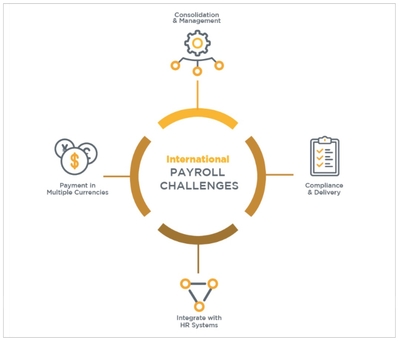 Just when you have it all figured out, you encounter yet another hurdle to global expansion. An exciting time for your business can turn into a headache, not least due to the challenges of international payroll.
Just when you have it all figured out, you encounter yet another hurdle to global expansion. An exciting time for your business can turn into a headache, not least due to the challenges of international payroll.
Simply put, you have employees who need to be paid in different countries with different legislation, currencies, tax rules, cultures, and languages. Sound confusing? That’s because it is. Even large multinationals struggle to overcome the challenges of executing an efficient international payroll process.
So what are the biggest challenges you’ll face when your growing company needs to pay people in different countries? We’ll go over four specific ones—compliance and delivery, consolidation and management, integration with HR and finance systems, and multiple currencies.
Challenge 1: Compliance and Delivery
When adapting to a global payroll solution, you run the risk of falling out of compliance with accounting legislation in multiple jurisdictions. The rules and regulations differ greatly from country to country. This is one of the biggest factors that deters firms from moving to a global operation. It is essential then for businesses to understand the corporate tax risks when employing staff in certain locations.
Before making the move, you need to be confident that compliance can be assured in every jurisdiction. Transparency over the process will ensure best practices in global payroll processes and tax legislation. Hiring a competent team of people who specialize in these areas will make the transition smoother and keep you on the right side of the regulating authorities.
Challenge 2: Consolidation and Management
Managing an international payroll process can prove exceptionally difficult when cultural, language, and time-zone differences exist. This layer adds complexity to ever-changing employment and tax legislation.
The challenge can be exacerbated when you’re dealing with multiple providers in different jurisdictions, and can add to time and compliance costs for your organization. If the providers don’t speak your language, how can you ensure transparency through the entire process?
For example, if reports are supplied in broken English, it may be difficult to analyse expenses and make accurate business decisions. An international payroll team should help you reduce the risk of compliance problems and lower the cost of paying staff in multiple locations and currencies.
Payroll reports also can become a time-consuming challenge to analyse if they’re coming from different directions in multiple formats. The solution is an integrated payroll system to help you forecast and make informed decisions.
Managing the tax situation can prove especially difficult. For example, when staff work from foreign tax jurisdictions or relocate for periods of time, you must ensure compliance with domestic and international tax laws. International tax experts can become a valuable part of your team. Here are some key factors and questions to ensure tax compliance:
- Is your mobile staff paying social security in the correct jurisdiction for long-term benefit?
- Have applications been submitted to authorities for exemptions or reductions in withholding taxes?
- Are you aware of both home and host country personal tax return requirements?
- Do you know every foreign payroll withholding obligation?
- Have you been made aware of foreign tax credit claims and treaty relief claims, cross-border relief claims, and, tax equalisation/protection calculations?
To combat mistakes and compliance issues with regard to tax law, maintain a team of highly specialized experts at your disposal.
Challenge 3: Integration
With HR & Finance Systems
The foremost promise to your employees is accurate paychecks issued on time.
Staff who don’t get paid on time get angry, which is understandable. Unfortunately, this can happen when different payroll systems are in place. An integrated system will streamline the process, simplifying reporting and improving accuracy.
Streamlined reports of payroll payments across locations will help you analyse data broken down by region. This is a lot quicker than pulling information together from multiple systems—a frustratingly long and painful process. How can you make a clear business decision if you don’t have the data to back it up? Solid, accurate reporting is an essential part of any international payroll system.
Challenge 4: Multiple Currencies
 Paying staff in multiple currencies can potentially lead to huge costs in administration. Being able to respond to fluctuating currency rates will reduce exposure and protect your employees from market risk.
Paying staff in multiple currencies can potentially lead to huge costs in administration. Being able to respond to fluctuating currency rates will reduce exposure and protect your employees from market risk.
You need to ensure that your employees don’t bear the cost of volatile foreign exchange transfer rates. This in turn will work out a lot cheaper than transferring currency with other service providers such as banks.
Here is an example of how a global payroll solution works:
A financial services company in New York requires a suite of international payroll solutions. It needs employer registrations and payroll to be set up in numerous locations across the globe. It also needs monthly payroll management in each location.
After a detailed review of the company structure, employee background, current systems, and employer needs, the payroll process can be streamlined with one point of contact across all global locations.
A streamlined international payroll solution includes:
- Calculations and pay slips for employees
- All necessary onward transfers to locations in local currency
- Advice on employee tax, payroll, and social security obligations
- Year-end and leaver documentation as required
- Preparation of home and host country personal tax returns for internationally mobile employees
The expertise required is quite specialised, particularly in the areas of tax and payroll, so it’s essential you have access to a team with these skills.
With global expansion, it’s inevitable that you will face the challenges of global payroll. With a centralised, outsourced process, you’ll remove much of the burden of managing an accurate global payroll process. Technology plays a vital role—as good software should enable you to standardise the global payroll process across multiple locations while reducing administrative responsibilities for internal staff.
It’s easier to cope with changes in legislation when you have a centralised system that can respond quickly to meet all your compliance requirements. This will help your global operation run smoothly and give you peace of mind with the knowledge that your employees are getting paid accurately and on time.